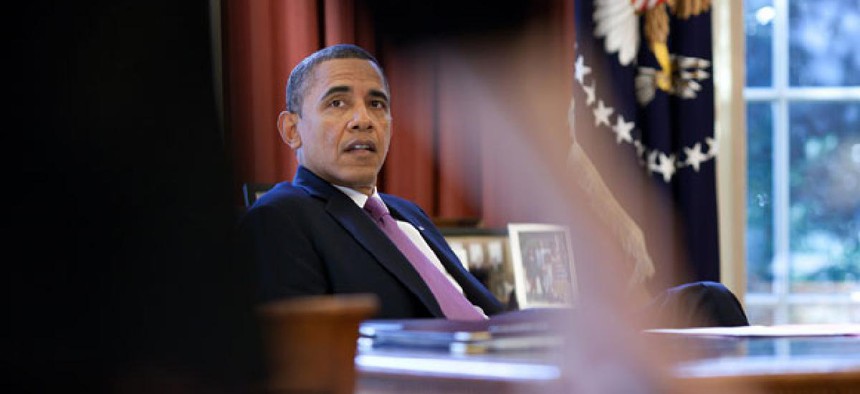
White House photo
Obama’s Uptick
Optimism about the economy is coming at the right time for the president and the wrong time for Mitt Romney.
Reality is often more complicated than conventional wisdom would have you believe, a point underscored in the latest NBC News/Wall Street Journal poll. The survey showed President Obama with a 6-point lead among all registered voters, a 7-point edge among registered voters in 12 swing states, and a 5-point advantage among likely voters nationally. The Obama lead in the survey, no matter which set of numbers you focus on, is wider than in many other public polls, including the widely watched automated robo-polls, which are not allowed to dial cell phones. Such robo-polls miss entirely the 30 to 40 percent of the electorate who don’t have land-line phones or rarely use them. The robo-polls rely on respondents who are not representative of the broader public and undercount young and minority voters, who are more likely than other demographic groups to have only cell phones.
As widely different as the NBC/WSJ poll is from many other public polls, the numbers are very close to the 4- or 5-point Obama lead I have been picking up in recent days from top pollsters and strategists from both parties. Of course, this shouldn’t be too much of a shocker, as the NBC/WSJ poll is conducted jointly by Peter Hart, the preeminent Democratic pollster (although Hart no longer does political campaigns), and Bill McInturff, a founder and partner of Public Opinion Strategies, a highly respected Republican polling firm.
To be sure, other highly regarded polls showed Obama with a smaller lead. The Gallup tracking poll conducted Sept. 11-17 had the race narrowing to a single point, 47 percent to 46 percent, down from a 3-point Obama lead from the two previous days, and a separate Sept. 11-17 Gallup poll in 12 swing states showed Obama up by 2 points, 48 percent to 46 percent. The most recent CBS News/New York Times national poll put the Obama edge at 3 points, 49 percent to 46 percent. Fox News had it at 5 points, 48 percent to 43 percent. The debate is over the margin, not over who is ahead.
There has been a lot of news in the past few weeks with the potential to affect the presidential race, including the party conventions and the anti-American violence in the Middle East. Obama’s job-approval rating in the Hart/McInturff survey, conducted Sept. 12-16 among 900 registered voters (including 270 cell-phone-only respondents), ticked up by 2 points since the August survey, from 48 percent to 50 percent, with his disapproval number dropping by a point to 48 percent. Not a big shift, but if you are an incumbent seeking reelection, it’s nice to have a job-approval rating of 50 percent or higher.
Three sets of numbers in other questions might explain the uptick. In the key “right direction/wrong track” question, called the “Dow Jones indicator of American politics” by the late Dick Wirthlin, President Reagan’s pollster, the “right direction” jumped up 7 points since August, from 32 percent to 39 percent; the “wrong track” dropped 6 points, from 61 percent to 55 percent. Obama’s job approval on handling the economy ticked up 3 points to 47 percent, while disapproval dropped 3 points, to 51 percent, perhaps driven by stock-market gains and more optimism about housing. In other words, Obama went from a net minus 10 points in August to a net minus 4 points in September. When asked, “During the next 12 months, do you think that the nation’s economy will get better, get worse, or stay about the same?” the percentage of respondents saying they expected the economy to get better increased 6 points, to 42 percent; the “get worse” remained the same at 18 percent; and the share saying “stay about the same” declined to 32 percent. In another question, 51 percent said they thought that the economy is recovering (up a point from August) and those saying that it isn’t dropped a point, so the net responses citing economic recovery shifted slightly from a net 4 to a net 6 points. These aren’t big changes, but they are an improvement on what had been Obama’s biggest liability: the state of the economy and the public’s perception of his stewardship of it.
While all of this modestly good news for the president was occurring, however, his approval rating on handling foreign policy dropped 5 points in a month, from 54 percent to 49 percent, with his disapproval number rising from 40 percent to 46 percent. Clearly, what is happening abroad is making an impression on voters, but it is being offset by a cautiously improving view of where the country and economy are going.
Central to Mitt Romney’s challenge is that too many Americans either don’t like him or can’t figure out if they do. Only 38 percent of registered voters had a positive view of Romney (the same as last month), while 43 percent had a negative view, 1 point down from August. Romney’s underwater ratings—minus 6 points in August, minus 5 points in September—compare with Obama being plus 5 points in August and plus 6 points this month.
Equally dispiriting for Republicans are the responses to questions about which candidate would be better in dealing with three subjects: Medicare, taxes, and the economy. On Medicare, 47 percent said that Obama would be better, while 37 percent chose Romney. On taxes, Obama had a 6-point edge, 45 percent to 39 percent. And on the economy, the two men are now tied at 43 percent, compared with a 6-point Romney edge in July.
With six weeks to go before the election, this contest is certainly not over. But it is becoming increasingly clear that Romney needs something to happen to change the trajectory of this race. Right now, it isn’t heading in a good direction for him.






